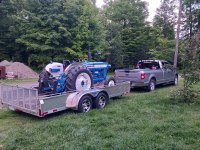I don't believe you have the springs or rear tires to handle a gooseneck SAFELY. While it's possible for some 1/2-ton trucks to tow certain gooseneck trailers, it's not generally recommended due to potential safety and mechanical issues. Gooseneck trailers typically exert a higher percentage of their weight onto the truck's hitch, potentially exceeding the truck's payload and tow ratings even if the overall trailer weight is within limits.
Here's why:
- Higher Tongue Weight:
Gooseneck trailers, compared to bumper-pull trailers, place a larger percentage of their weight (20-25%) on the truck's hitch. This can quickly overload the truck's payload capacity, even if the overall trailer weight is within the truck's tow rating.
- Payload Capacity:
A half-ton truck's payload capacity (the amount of weight it can carry in the bed and on the hitch) is often limited. Exceeding the payload can lead to unsafe handling, increased braking distances, and potential damage to the truck.
- Safety Concerns:
Overloading a half-ton truck with a gooseneck trailer can result in compromised handling, especially in situations like turns, braking, or encountering uneven road surfaces.
I'm not saying it can't be done, but if a crash happens, you may not have a leg to stand on, legally or insurance wise. Certainly, the gooseneck type hitch has some great advantages: turn radius, emergency avoidance, and very high speed stability (as long as the truck can take the side to side load transfer that goes on during all of this). Plus, it isolates the trailer's roll mode from the truck's roll dynamics, unlike a 5th wheel hitch).
But, people do it with campers all the time. Ask your insurance company what they think, and have the GVWR and tire placard info handy if the DOT police pull you over.
I disagree with this, and here is why.
The O/P says that he has a 5200 pound tractor that he is currently hauling with a bumper pull trailer. If it is safe and legal for him to pull that weight with his current F150, then moving the hitch point from the bumper to above the rear axle will make hauling the load so much safer it isn't even close! By moving it to a gooseneck, you have just moved the weight that was hanging off the back end, causing the front end to be extremely light, (which needs to be heavier in order to have traction for the front tires so they can stop the vehicle) to about an inch in front of the rear axle center which makes the vehicle so much more stable, and puts the weight on the vehicle rather than pushing down behind it.
What most people consider with a gooseneck trailer is that they will pull more weight, because you can put more on the tow vehicle, which requires a bigger truck, so we see them being pulled by bigger trucks.
I say have the O/P go weigh his bumper pull trailer as to how much weight he has on the trailer tires, and then compare that to a gooseneck (adjusting for tare weigh of each vehicle) and my thoughts are, if he puts the tractor weight in the same place (again, allowing for the difference in tare weight), I imagine he will have a much safer combination towed vehicle. Now there are a couple things that might skew this a little, so he will have to actually go weigh both trailers while hooked up to his tow vehicle. Just pull across the scale and leave only the trailer axles on the platform. Do that empty and loaded to determine how much weight you have on the trailer axles themselves. When you calculate how much the tractor is adding to the bumper pull, make sure it is adding the same amount to the gooseneck. What that does is keeps you from putting more weight on the tow vehicle when you change to a gooseneck. What you will end up with is a comparison of apples to apples and not apples to oranges.
i am pretty sure, if you graduate to a gooseneck, and keep the same amount of the tractors weight on the trailer, there won't be a huge difference in what your tow vehicle is doing, but it will handle it so much better because it isn't hanging off the back bumper, and the weight is being split between the drive axle and the steering axle.
David from jax

